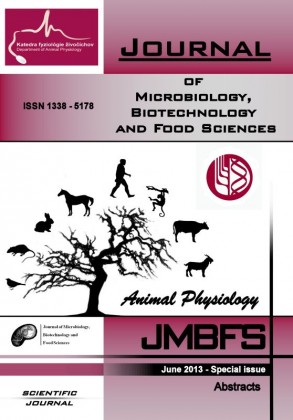THE ACTIVITY OF SUPEROXIDE DISMUTASE AND GLUTATHIONE PEROXIDASE IN KIDNEYS AND LIVER OF MICE EXPOSED TO ACRYLAMIDE
Keywords:
acrylamide, superoxide dismutase, glutathione peroxidaseAbstract
Acrylamide monomer causes neurotoxicity, male reproductive toxicity and endocrine – related tumors in rodents. Acrylamide was found in food, heat-processed potato products, coffee, bread and has been classified as probable human carcinogen by IARC. Daily intake from foodstuff was estimated in the range of 0.3-0.8 mg/kg bw per day (Seal et al., 2008). Glutathione peroxidase catalyzes the reduction hydrogen peroxide by glutathione. Extracellular superoxide dismutase catalyzes the dismutation of superoxide radical to hydrogen peroxide and oxygen. The activity of superoxide dismutase and glutathione peroxidase has been examined. The research was conducted on SWISS mice 8 week old, weight 26 g. Decapitation was carried out after 48, 72 and 192 hours after acrylamide injection. Animals received two doses of acrylamide 20 mg/kg and 40 mg/kg with intraperitoneal injection three times a week. Control group received physiological saline 3 times a week. The activity of superoxide dismutase was higher in the kidneys than in the liver. The activity of glutathione peroxidase was reported higher in the kidneys than in the liver.Downloads
Download data is not yet available.
Downloads
Published
2013-06-06
How to Cite
Kinga, K., Grzegorz, F., & Marta, K. (2013). THE ACTIVITY OF SUPEROXIDE DISMUTASE AND GLUTATHIONE PEROXIDASE IN KIDNEYS AND LIVER OF MICE EXPOSED TO ACRYLAMIDE. Journal of Microbiology, Biotechnology and Food Sciences, 2(Abstracts special issue), 21. Retrieved from https://office2.jmbfs.org/index.php/JMBFS/article/view/7553
Issue
Section
Biotechnology
License
Copyright (c) 2013 Kraska Kinga, Formicki Grzegorz, Kopańska Marta

This work is licensed under a Creative Commons Attribution 4.0 International License.
All papers published in the Journal of Microbiology, Biotechnology and Food Sciences are published under a CC-BY licence (CC-BY 4.0). Published materials can be shared (copy and redistribute the material in any medium or format) and adapted (remix, transform, and build upon the material for any purpose, even commercially) with specifying the author(s).

